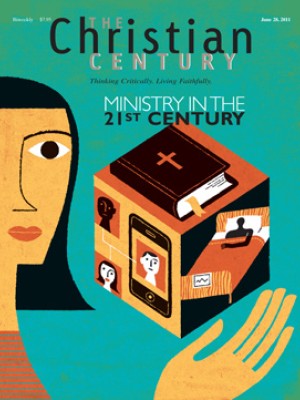Sunday, July 3, 2011: Zechariah 9:9-12; Matthew 11:16-19, 25-30
"Rejoice greatly, O daughter Zion!" says the bold, insensitive prophet.
I had just arrived in a new parish when a member told me how, in a horrific flash of fewer than two years, her husband died, her son was incarcerated for drug possession and her daughter committed suicide. The woman was disconsolate, drowning in grief and despairing of her empty, painful future. That's when her pastor dared to say something so bold, so outrageous, that she never forgot it. "Thank God every day," he counseled her, "even and especially when you can scarcely find a reason to do so." She admitted that there were many days when she couldn't manage to thank God for anything, but she summoned the courage to try, and in time thanks became a daily practice and a source of strength, hope and eventually even joy for her—not to mention a profound and unforgettable lesson for her new pastor many years later.
"Rejoice greatly, O daughter Zion!" says the bold, insensitive prophet to a people mired in the desolate aftermath of exile (Zech. 9:9–12). Those who had been under Persia's benevolent but powerful thumb returned to find their homeland of Zion a gaunt skeleton of its former glory. God's temple was rubble; the infrastructure had crumbled; the landscape had been ruined by destruction, decay and disorder. Local politics were unstable under the hot breath of empire; rebuilding efforts were slow and ineffective in a sagging, unsteady economy. The glorious past was dead, and the future was bleak. In the prophet's poignant phrase, the people were "prisoners of hope." The people of northern Japan, Haiti and the lower ninth ward of New Orleans know only too well the bitter taste of such confines—and how screechingly off-key the prophet's voice sounds. Rejoice greatly? Thank God every day?
Read our latest issue or browse back issues.
But the bold, insensitive, barely believable counsel of scripture looks at the future not through the eyes of our present time, but through the eyes of God's future. This is especially difficult when the present is dark and the future is so far beyond the horizon that we can scarcely make out even the faintest glow of its light. It is then that we must rely on God to send us prophets who can share with us a reality beyond our reach, the cause and the case for faith, the assurance of things hoped for, the conviction of things not seen (Heb. 11:1).
This is the vision of the prophet, priest and king named Jesus, the one Matthew presents as evidence of Zechariah's ancient hopes come true. Jesus must contend, however, with the shortsightedness that is all around him. There's no pleasing his generation: John is rejected for being too ascetic, Jesus for being too indulgent. The people won't mourn at a funeral or make merry at a wedding. They won't listen to God's word no matter how it comes to them—tenderly or harshly, via bugle or flute, dirge or dance. What's a Messiah to do? Surely by now Jesus' vision also anticipates the perils of his public ministry and the grisly end to which all this is leading. His present is frustrating and his future looks bleak.
"At that time Jesus said, 'I thank you, Father, Lord of heaven and earth, because you have hidden these things from the wise and the intelligent and have revealed them to infants; yes, Father, for such was your gracious will.'" Some days it's really hard to thank God. Sometimes it's a stretch.
Yet those who do manage to give thanks, like the grieving woman and the burdened Messiah, emerge from their prayers with wondrous gifts to share. Upon finishing his prayer, Jesus offers rest for the weary and heavily burdened. He knows firsthand how much they need it.
What does this rest look like? Matthew paints a vivid, ironic picture. In the very next scene, Jesus defends his hungry disciples for the illegal acts of plucking grain and eating on the sabbath, then causes a scene in the synagogue with his question, "Is it lawful to cure on the sabbath?" In the deafening silence he restores a man's shriveled hand to wholeness, and the horrified authorities immediately plot his demise. (The violation of holy sabbath is so galling that no one stops to consider whether conspiring to murder should be considered work.) For Jesus, rest is more than the absence of work; it is the active presence of restorative power.
What Jesus calls rest, while those around him define it as work, we might call recreation or re-creation. Bodies are replenished and restored, renewed and re-created for another day. Sabbath itself is re-created not as a weekly burden of vigilant inactivity but as a weekly climax in God's delightful, ongoing project of creation. People too are re-created, refined and reshaped by a healing and life-giving word that clears new space for hope by making a better future imaginable and at times visible. It is often slow and overwhelming work characterized by setbacks and struggles. Re-creating northern Japan, Haiti and New Orleans will take even longer than healing a triply broken heart—a long time indeed. Matthew would say centuries.
Yet Jesus gets us started with small but determined steps. "Rest. Eat. Dance. Extend to me what is broken and burdensome." Soon the sated disciples have reason to give thanks, and a faithful man has been given back his hand and can fold it in prayer or open it in generosity. There is both new occasion and wherewithal to give thanks to God. It is that act of giving thanks, a wise woman once taught me, that is the disciplined first step on the path of liberation to a future worthy of great rejoicing.






